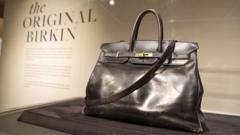In a case that captured global headlines, ten defendants face trial for their roles in the audacious 2016 robbery of Kim Kardashian in Paris. The bizarre events not only highlight the heist itself but also the unlikely culprits: a group of elderly criminals dubbed the "grandpa robbers," who targeted one of the biggest names in modern celebrity culture.
'Grandpa Robbers' on Trial for Kim Kardashian Heist: Unraveling the Story Behind the Robbery

'Grandpa Robbers' on Trial for Kim Kardashian Heist: Unraveling the Story Behind the Robbery
A deep dive into the infamous Paris heist reveals the identities and motives of the aging criminals behind Kim Kardashian's high-profile robbery.
The morning following the robbery, Yunice Abbas, the 62-year-old mastermind of the heist, awoke to find his wife glued to the news, where a stunned world learned that Kim Kardashian had been robbed at gunpoint in her Paris hotel. The stolen jewels, including a $4 million engagement ring from rapper Kanye West, were valued at approximately $10 million. Abbas, who penned a memoir claiming this was to be his final crime before retirement, quickly found himself in hot water as French authorities closed in.
A trial now unfolding in Paris is expected to last three weeks, with Abbas and four other men implicated in the robbery while others face charges for assisting. Many of these defendants, born in the 1950s, have been humorously dubbed the "grandpa robbers" by local media. While Abbas and an accomplice have confessed to their crimes, the remaining members have maintained their innocence, and one is excused from trial due to dementia.
The actual crime took place in the early hours of October 3, 2016, when Abbas and his accomplices—dressed as police officers—broke into Kardashian's luxury suite. The reality star was alone and vulnerable after a busy week of Fashion Week festivities. The robbers handcuffed the night receptionist, Abderrahmane Ouatiki, forcing him to escort them to Kardashian's room. There, they bound her in zip ties and duct tape, demanding her jewelry amidst her panicked pleas for help.
After the robbery, Abbas would discover the gravity of their actions when he saw breaking news reports acknowledging Kardashian’s identity. Investigators later traced the thieves through their DNA, which was left behind at the scene, leading to swift arrests.
Speculations abound concerning how the robbers were tipped off about Kardashian’s whereabouts. Evidence suggests that Gary Madar—transportation provider for the Kardashian family—may have shared inside information with the criminals. When confronted, Madar’s attorney defended him, stating that their communications were merely casual exchanges.
The ongoing trial seeks to uncover both the fate of the stolen jewels and to illuminate the various interactions leading up to one of the most notorious celebrity robberies in history. Abbas and his cohorts, while undoubtedly clumsy in their approaches, highlight the absurdity of the intersection between old-school crime and modern celebrity culture—a reality star pursued by criminals far detached from the fame she represents.
As news crews prepare for the trial and Kardashian's impending testimony, it’s a compelling reminder of the chaos that ensues when disparate worlds collide—both for the victims and the perpetrators. The trial will culminate with Kardashian standing as a witness, bringing her dramatic experience full circle as the case that cast a long shadow over her life is put to rest in a Paris courtroom.
A trial now unfolding in Paris is expected to last three weeks, with Abbas and four other men implicated in the robbery while others face charges for assisting. Many of these defendants, born in the 1950s, have been humorously dubbed the "grandpa robbers" by local media. While Abbas and an accomplice have confessed to their crimes, the remaining members have maintained their innocence, and one is excused from trial due to dementia.
The actual crime took place in the early hours of October 3, 2016, when Abbas and his accomplices—dressed as police officers—broke into Kardashian's luxury suite. The reality star was alone and vulnerable after a busy week of Fashion Week festivities. The robbers handcuffed the night receptionist, Abderrahmane Ouatiki, forcing him to escort them to Kardashian's room. There, they bound her in zip ties and duct tape, demanding her jewelry amidst her panicked pleas for help.
After the robbery, Abbas would discover the gravity of their actions when he saw breaking news reports acknowledging Kardashian’s identity. Investigators later traced the thieves through their DNA, which was left behind at the scene, leading to swift arrests.
Speculations abound concerning how the robbers were tipped off about Kardashian’s whereabouts. Evidence suggests that Gary Madar—transportation provider for the Kardashian family—may have shared inside information with the criminals. When confronted, Madar’s attorney defended him, stating that their communications were merely casual exchanges.
The ongoing trial seeks to uncover both the fate of the stolen jewels and to illuminate the various interactions leading up to one of the most notorious celebrity robberies in history. Abbas and his cohorts, while undoubtedly clumsy in their approaches, highlight the absurdity of the intersection between old-school crime and modern celebrity culture—a reality star pursued by criminals far detached from the fame she represents.
As news crews prepare for the trial and Kardashian's impending testimony, it’s a compelling reminder of the chaos that ensues when disparate worlds collide—both for the victims and the perpetrators. The trial will culminate with Kardashian standing as a witness, bringing her dramatic experience full circle as the case that cast a long shadow over her life is put to rest in a Paris courtroom.





















